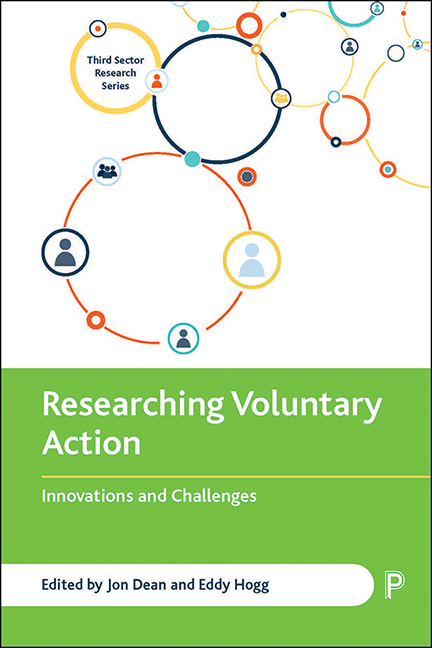Book contents
- Frontmatter
- Contents
- List of figures, tables and boxes
- Notes on contributors
- Acknowledgements
- Series editor’s foreword
- 1 Introduction
- 2 (Un)suitable methods and reflexive considerations: an interview and focus group study of youth volunteering
- 3 Interpretive ethnography: a UK charity shop case study
- 4 Collaborative philanthropy and doing practically relevant, critical research
- 5 Peer research: co-producing research within the context of voluntary and community action
- 6 Charity advertising: visual methods, images and elicitation
- 7 Using archives and objects in voluntary action research
- 8 Using Mass Observation as a source of qualitative secondary data for interdisciplinary longitudinal research on voluntary action
- 9 Investigating meanings and messages on volunteering through television media
- 10 Annual reporting in voluntary organisations: opportunities for content analysis research
- 11 Researching risk in the voluntary sector: the challenges and opportunities of regulatory data
- 12 Exploring the benefits of volunteering: combining survey and administrative data in the Nordic ‘laboratory’
- 13 Spatial approaches to the voluntary sector
- 14 Restudies, surveys and what counts as volunteering
- 15 Conclusion
- References
- Index
15 - Conclusion
Published online by Cambridge University Press: 15 September 2022
- Frontmatter
- Contents
- List of figures, tables and boxes
- Notes on contributors
- Acknowledgements
- Series editor’s foreword
- 1 Introduction
- 2 (Un)suitable methods and reflexive considerations: an interview and focus group study of youth volunteering
- 3 Interpretive ethnography: a UK charity shop case study
- 4 Collaborative philanthropy and doing practically relevant, critical research
- 5 Peer research: co-producing research within the context of voluntary and community action
- 6 Charity advertising: visual methods, images and elicitation
- 7 Using archives and objects in voluntary action research
- 8 Using Mass Observation as a source of qualitative secondary data for interdisciplinary longitudinal research on voluntary action
- 9 Investigating meanings and messages on volunteering through television media
- 10 Annual reporting in voluntary organisations: opportunities for content analysis research
- 11 Researching risk in the voluntary sector: the challenges and opportunities of regulatory data
- 12 Exploring the benefits of volunteering: combining survey and administrative data in the Nordic ‘laboratory’
- 13 Spatial approaches to the voluntary sector
- 14 Restudies, surveys and what counts as volunteering
- 15 Conclusion
- References
- Index
Summary
As we outlined in the Introduction, this volume is an effort to encourage scholars in the field to focus on methodology rather more than at present. Our hope is that it will start a conversation about how we can best research and understand the myriad different forms of voluntary action across the world. Given the numerous books, journals, articles and reports devoted to exploring new facets of giving, charity and voluntary organisations, it seemed strange to us that methodological debates appear to take place mostly in disciplines rather than the field itself. This book has presented a rich compendium of methodological innovations, and the challenges that different researchers face in gathering, using and explaining their data, in different approaches. By taking the case study approach, we have shone a light on new and modified approaches that leading and emerging scholars are taking in applying different methods to our field. The study and practice of methods is, in our view, very much a lived discipline, as it is much easier to understand and grapple with the use of a methodological approach in practice as opposed to seeing it described as a dry process. Hopefully, the cases presented here will offer inspiration for your work, which in turn abets replication and validity to a new approach, as the twin projects of Dean and Bhati have done.
We have seen calls in the last 10 years, from policy makers and organisations in the voluntary and community sector alike, for particular types of measurement when it comes to the impact of voluntary action. Often this is framed around calls to quantify ‘impact’ in terms of contributions to gross domestic product or savings delivered for the state. The contributions to this volume have shown that this kind of dogmatic emphasis on a certain type of highly positivist method does not serve the best interests of those who want to understand the contribution that voluntary action makes to individuals, communities and societies. Demonstrating impact does not need to mean only spelling it out in hard currency. By embracing a range of methods and using those that are suited to understanding the different facets of voluntary action, we can gain the richest possible understanding, one that is celebratory, critical, nuanced, precise and so much more.
- Type
- Chapter
- Information
- Researching Voluntary ActionInnovations and Challenges, pp. 171 - 176Publisher: Bristol University PressPrint publication year: 2022



